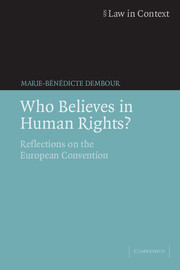Book contents
- Frontmatter
- Contents
- Acknowledgements
- Table of cases
- List of tables
- 1 Introduction
- 2 The Convention in outline
- 3 The Convention in a realist light
- 4 The Convention in a utilitarian light
- 5 The Convention in a Marxist light
- 6 The Convention in a particularist light
- 7 The Convention in a feminist light
- 8 The human rights creed in four schools
- 9 Conclusion: In praise of human rights nihilism
- Appendices
- Select Bibliography
- Index
7 - The Convention in a feminist light
Published online by Cambridge University Press: 03 February 2010
- Frontmatter
- Contents
- Acknowledgements
- Table of cases
- List of tables
- 1 Introduction
- 2 The Convention in outline
- 3 The Convention in a realist light
- 4 The Convention in a utilitarian light
- 5 The Convention in a Marxist light
- 6 The Convention in a particularist light
- 7 The Convention in a feminist light
- 8 The human rights creed in four schools
- 9 Conclusion: In praise of human rights nihilism
- Appendices
- Select Bibliography
- Index
Summary
Women are born free and remain equal to men in rights.
(de Gouges)The first article of the ‘Declaration of the Rights of Man and of the Citizen’ adopted by the French National Assembly in 1789 proudly stated: ‘Men are born and remain free and equal in rights’. One year later, Olympe de Gouges asserted in a pendant ‘Declaration of the Rights of Woman’, of her own making: ‘Women are born free and remain equal to men in rights.’ This stance did not go down well. On 3 November 1793, de Gouges was guillotined – like a man – for having forgotten the virtues of her sex and having inappropriately sought to become a statesman.
In their early formulations, the natural rights of man were not meant to be the rights of every human being. The great majority found compelling rather than repulsive the idea that some categories of people, including women and slaves, fell outside their ambit. This is no longer the case. Today few would dare to deny that human rights are meant to be the rights of every single human being. A feminist critique has nonetheless emerged in the last two decades which argues that human rights have been and remain typically male in their conception.
- Type
- Chapter
- Information
- Who Believes in Human Rights?Reflections on the European Convention, pp. 188 - 231Publisher: Cambridge University PressPrint publication year: 2006
- 1
- Cited by



